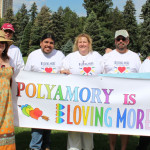 Polyamory and the exact meaning of the word is often the subject of debate among self-identified polyamorous people. It has been much debated on websites, at conferences and discussion groups around the country. Even among leading polyamory activists the term is debated over and over again. What is the source of the controversy?
Polyamory and the exact meaning of the word is often the subject of debate among self-identified polyamorous people. It has been much debated on websites, at conferences and discussion groups around the country. Even among leading polyamory activists the term is debated over and over again. What is the source of the controversy?
Webster’s Dictionary defines polyamory as “the state or practice of having more than one open romantic relationship at a time.”
Wikapedia defines polyamory as “the practice, desire, or acceptance of having more than one intimate relationship at a time with the knowledge and consent of everyone involved.”
The Loving More Nonprofit website, defines polyamory as “romantic love with more than one person, honestly, ethically, and with the full knowledge and consent of all concerned.”
These definitions are different but similar enough that the answer seems simple so why the constant debate about how to define polyamory? I believe the challenge stems from the challenge people have with love and how to define different kinds of love. Poly, “a Greek term meaning many” and amor, “a Latin term meaning love” together form a simple concept of many loves. Put this way, most people who love are polyamorous as they love their family, friends and children. But with the term polyamory we are not talking about a broad term of love but the romantic sexual love and this is where so much confusion can set it for so many people.
In our outer world culture, sexual, romantic love is a well-defined box that every human being is supposed to be seeking. We are bombarded with the idea that we can only find romantic sexual love with one person, our soul-mate. We are to search and date until we find the one, marry, have kids and be fulfilled forever with this one person. This is the one right relationship that is supposed to fulfill all our needs and sweep us away into bliss. This is the monogamy narrative most people are raised with and it permeates every bit of our culture. It defines real love (love with our eternal soul-mate) as the one who we will “forsake” all others for. It is in our literature, music, movies, even our politics and is ingrained over a lifetime of subliminal and direct propaganda. The reality for many people is far different, regardless the narrative remains.
For polyamorous folks, we have, or are trying to discard this narrative. In letting go of the narrative we also let go of the narrow definition of romantic love. Suddenly all is not so clearly defined. You can love in different ways, different intensity and experience an array of romantic and or sexual love. We can experience a partner who we love, spend romantic time with but we are not sexual with them. We can meet wonderful lovers we move in and share our daily lives with, and some we may see just twice a year. We love them, they are romantic or love partners but they do not fit the box of the eternal soul-mate we forsake all others for.
I believe that this is why we have so much trouble defining the concept of polyamory. Romantic sexual love outside marriage has often been forbidden. In the USA there is a torrent of sex negativity and religious shame associated with sex and sexual love. Our culture is more accepting of romantic love than sexual gratification, so people often have issues with proudly saying “I am polysexual” or “I love sex.”
As a result polyamory has often been more defined by what it is not rather than by what it is (i.e. non-monogamy, not swinging, etc). At the core polyamory is about the freedom to embrace our emotional bonding to people we are sexually or romantically attracted to and with as many people simultaneously as we have the bandwidth to handle (within the context of our agreements in our relationships). That kind of openness to love is hard to quantify or explain since many people experience emotions, love and romance in very personal and unique ways. Then when we try to explain it in a world that says loving more than one person romantically and/or sexually is wrong, we ourselves can become confused.
When I am asked about how polyamory is different from simply sleeping around or swinging, my answer is always that it has more to do with intent than anything else. When I meet someone and feel an attraction/connection it is my intention to explore the possibility of a lasting relationship. For my dear friend who loves swinging, her intention is to have a fun sexual encounter and be done. Her choice is right for her and mine is right for me. She does not describe herself as polyamorous and I do not describe myself as a swinger. In the end we are both seeking what fulfills us personally on different ends of a spectrum. Many people are somewhere in the middle of this spectrum, they enjoy sex for fun and they have many loves, while other people are genuinely monogamous.
Polyamory is about romantic love with more than one person simultaneously and with honesty for all involved. Past that how do you define romance, love and sexual love? Do we as a community need to define polyamory?
 Polyamory opens people to forming love bonds with more than one romantic partner. This opens up the possibility of multi-adult families raising children and living together. Most swingers do not bring their sex play buddies home for the holiday dinner with the parents and grandkids. They don’t have to decide which partner goes to the company party with them or how to share the house the five of them are buying to live in as a family.
Polyamory opens people to forming love bonds with more than one romantic partner. This opens up the possibility of multi-adult families raising children and living together. Most swingers do not bring their sex play buddies home for the holiday dinner with the parents and grandkids. They don’t have to decide which partner goes to the company party with them or how to share the house the five of them are buying to live in as a family.
Many polyamorous people dream of multi-adult family living in community and with this comes legal issues of parenting, jobs and even where or if you can live together. For those who naturally orient to polyamory the legal issues can be challenging. People fear losing children, jobs and being disowned by family who just don’t understand. Most are not comfortable asking a partner or partners to hide in the closet when a parent drops by unannounced. When we love people and they are part of our lives we want to share that with friends and family the same way the average person wants to share their new love/partner. It is about being able to be open to the world that this is my family whether there are two or seven people that are in your home and in your heart. For many of us they are all our soul-mates.
The next time you get pulled into a debate of definitions for polyamory, it might be wise to step back and take a deeper look at what love, sex and romance mean to you and how that might differ from other people. It is not about being right or wrong but about what love is to us. No one has the right to define love, romance or sex for you. Only you know your emotions, perspective and expectations. The best we can do is communicate where we as individuals are coming from.
Loving More will continue to define polyamory as “romantic love with more than one person, honestly, ethically, and with the full knowledge and consent of all concerned” regardless of the continued debate. It is important in how we as a movement are perceived and our ability to change perceptions of relationships in general. We are here to help people navigate polyamory, to support relationship skills for healthy relationships and to protect polyamory families through support and awareness.








The Websters definition seems pretty poor to me. I subscribe to the Wikipedia definition, since, unlike Websters’, it includes me as a polyamorous person. (I only have one love/partner in my life at this time, yet I’d really like to have another as well.